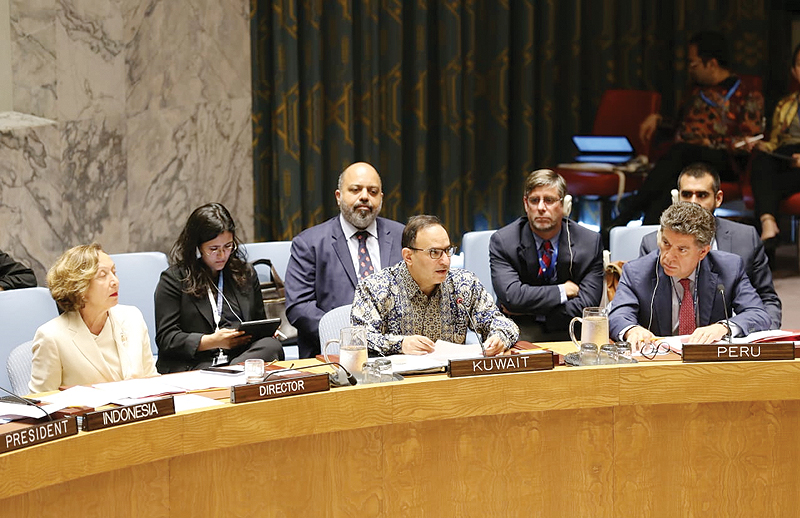NEW YORK: Kuwait Representative to the United Nations tabled to the UN Security Council on Thursday a draft resolution on the institutional framework for handing the issue of missing people during armed conflicts. "The draft is based on a national ordeal undergone by many families in Kuwait," Ambassador Mansour Al-Otaibi said in a speech to the Security Council meeting on 'Protection of Civilians in Armed Conflict.' "The Council has no point of reference in addressing the issue of missing persons in armed conflict so far. If there are such points of reference and specific measures in this regard before the eruption of conflict, great results could follow in the post-conflict reconciliation," he argued.
The Kuwaiti draft emphasizes the rules of the international humanitarian law and the human rights law relating to missing in action (MIAs), Ambassador Otaibi went on. He added that Kuwait plans to arrange for a meeting to brief the Security Council on this issue during its presidency of the Council next month, voicing that the Council would adopt the draft. He noted that 2019 marks the 70th anniversary of the Geneva Conventions of 1949 which represent a cornerstone of international humanitarian law. It also marks the 20th anniversary of the adoption of the Security Council Resolution 1265 on the protection of civilians as an item on the Council's agenda.
Peace processes
Separately, a Kuwaiti diplomat said on Friday that coordination with countries hosting peace processes is important to proliferate notions of peace and security around the globe. Delivering Kuwait's speech to the UNSC Arria-Formula Meetings on peace, first secretary of the Kuwaiti UN mission in New York Fawaz Bourseli said that reforming the security sector and building its capabilities in addition to supporting the actions carried out by the UNSC and the General Secretariat all contribute to the peace internationally. The Kuwaiti diplomat lauded the Cairo Roadmap for Enhancing Peacekeeping Performance, which developed the concept of peacekeeping cooperation to include host countries.
Bourseli said that usually peacekeeping forces deploy after the end of conflicts and wars as part of a political process to promote peace and security. He added that peacekeeping could be used as a tool to prevent conflicts from ever occurring in the first place by managing and eradicating the source of disputes among countries and parties. Including countries hosting peace processes will address priorities and help in realizing peace in a more orderly fashion, indicated the diplomat. He affirmed that coordination and cooperation between UN peacekeeping forces and host countries would help to effectively promote peace on a wider scale. Bourseli mentioned the processes in Darfur and Haiti as an example of effective cooperation for peace. - KUNA











